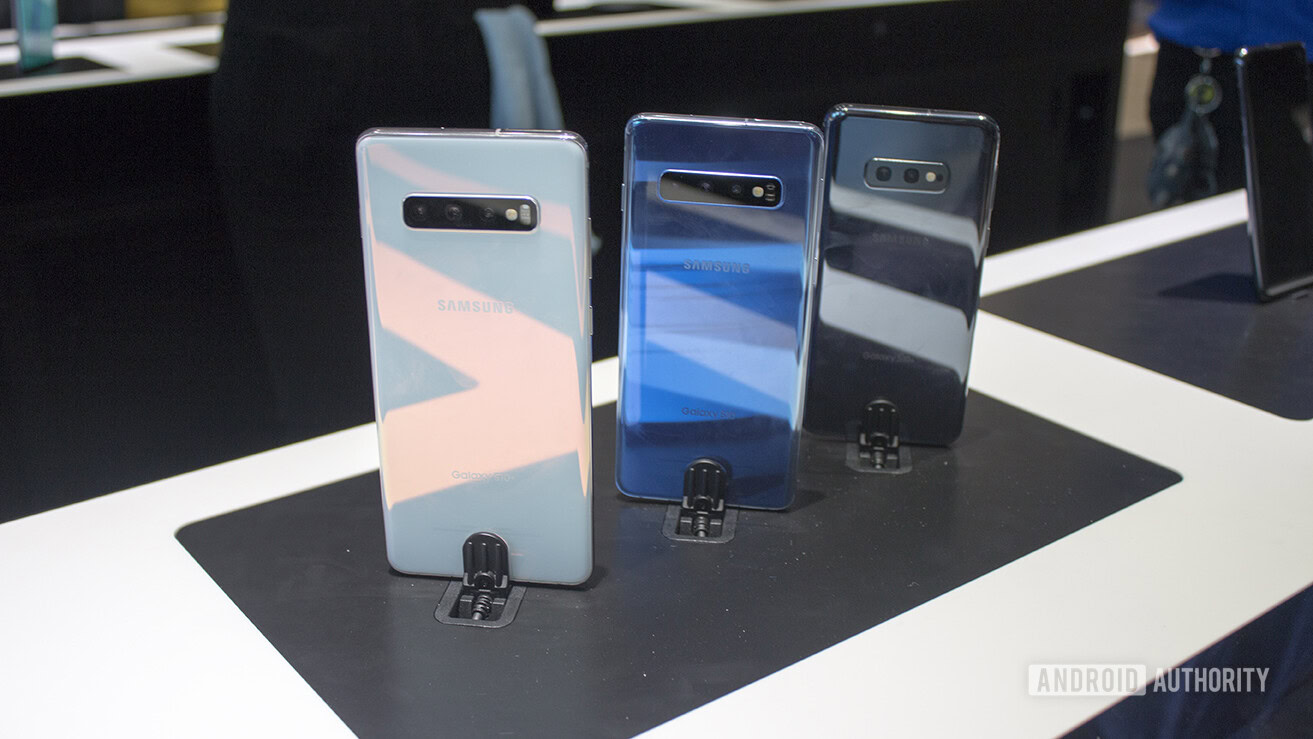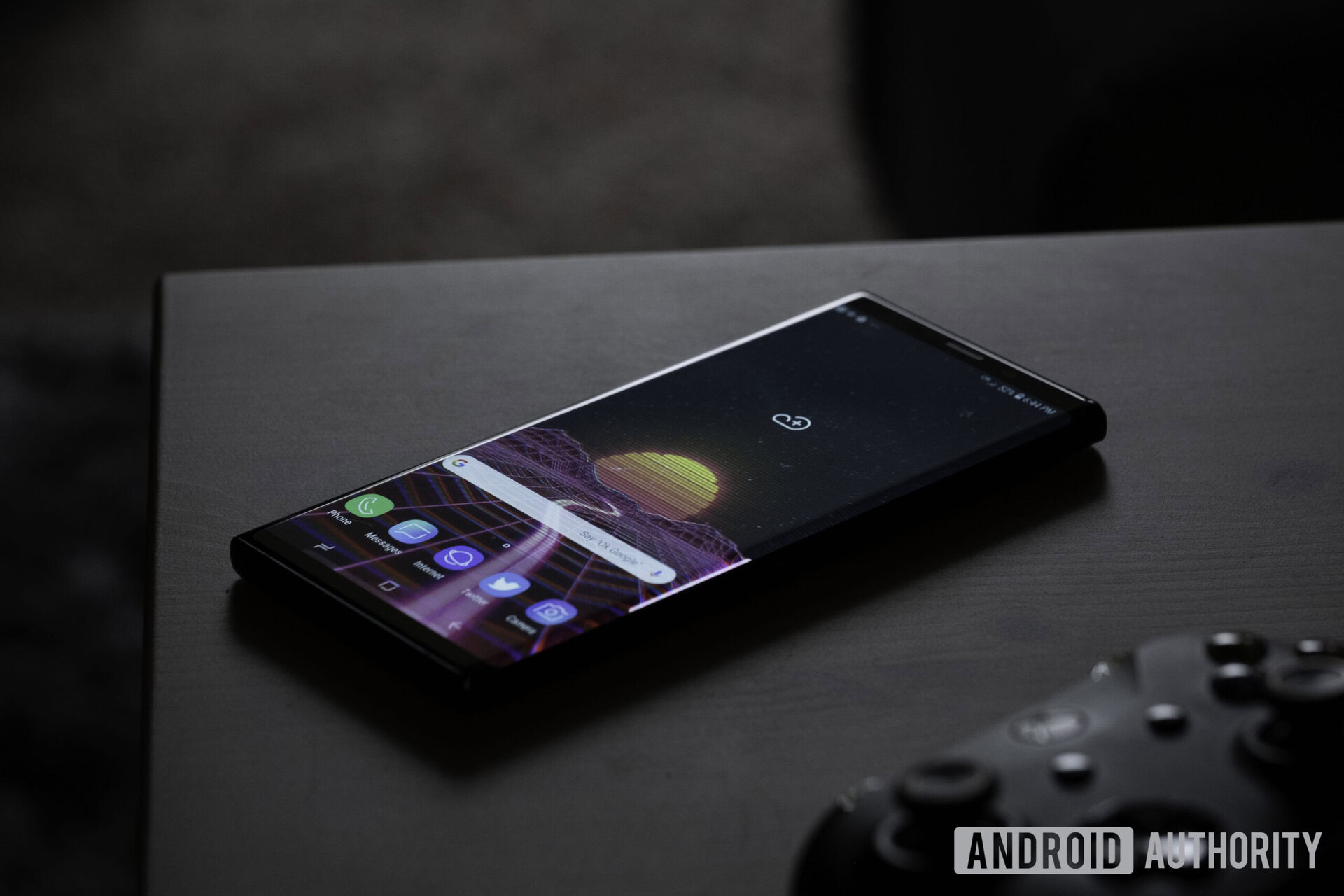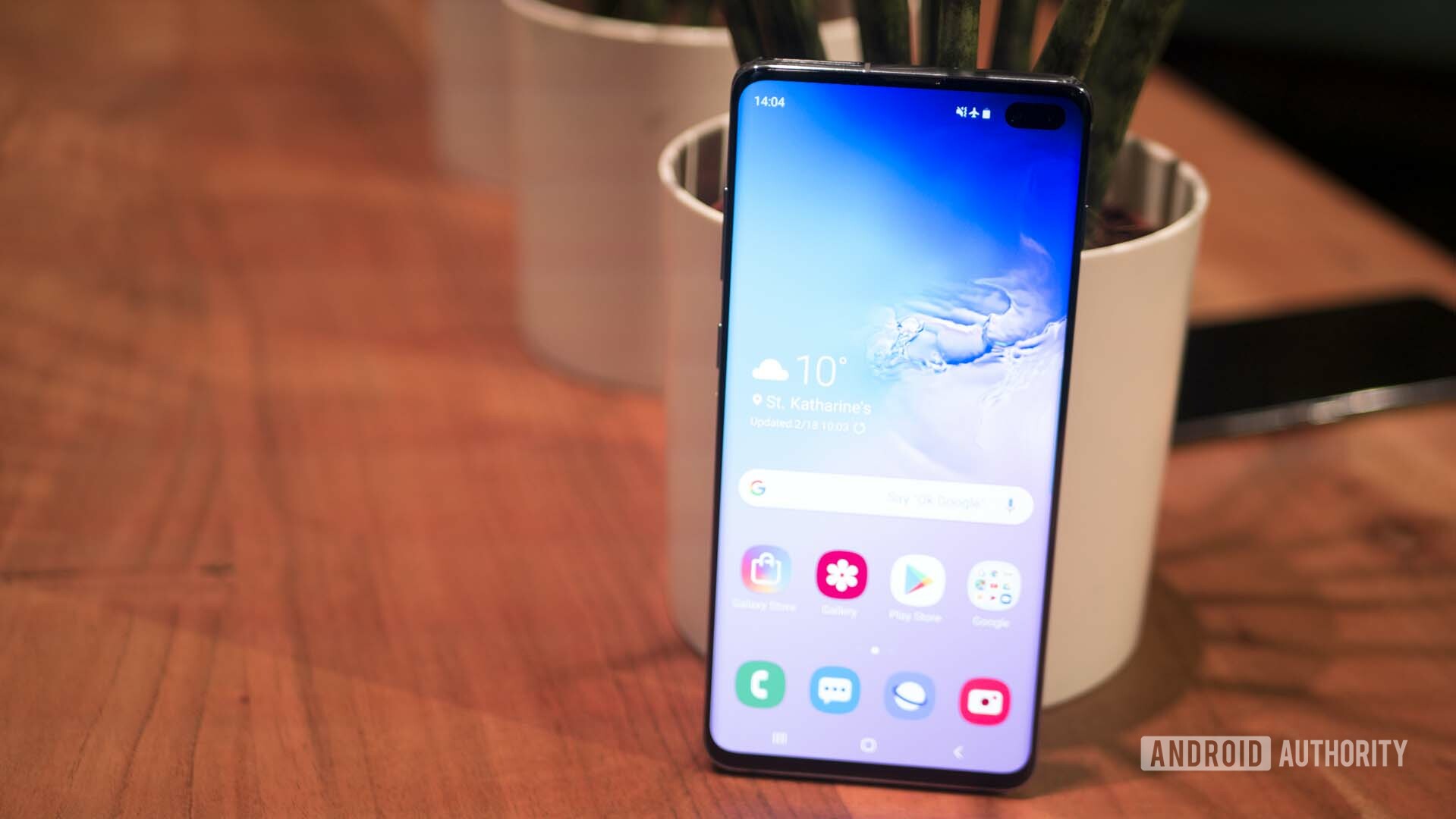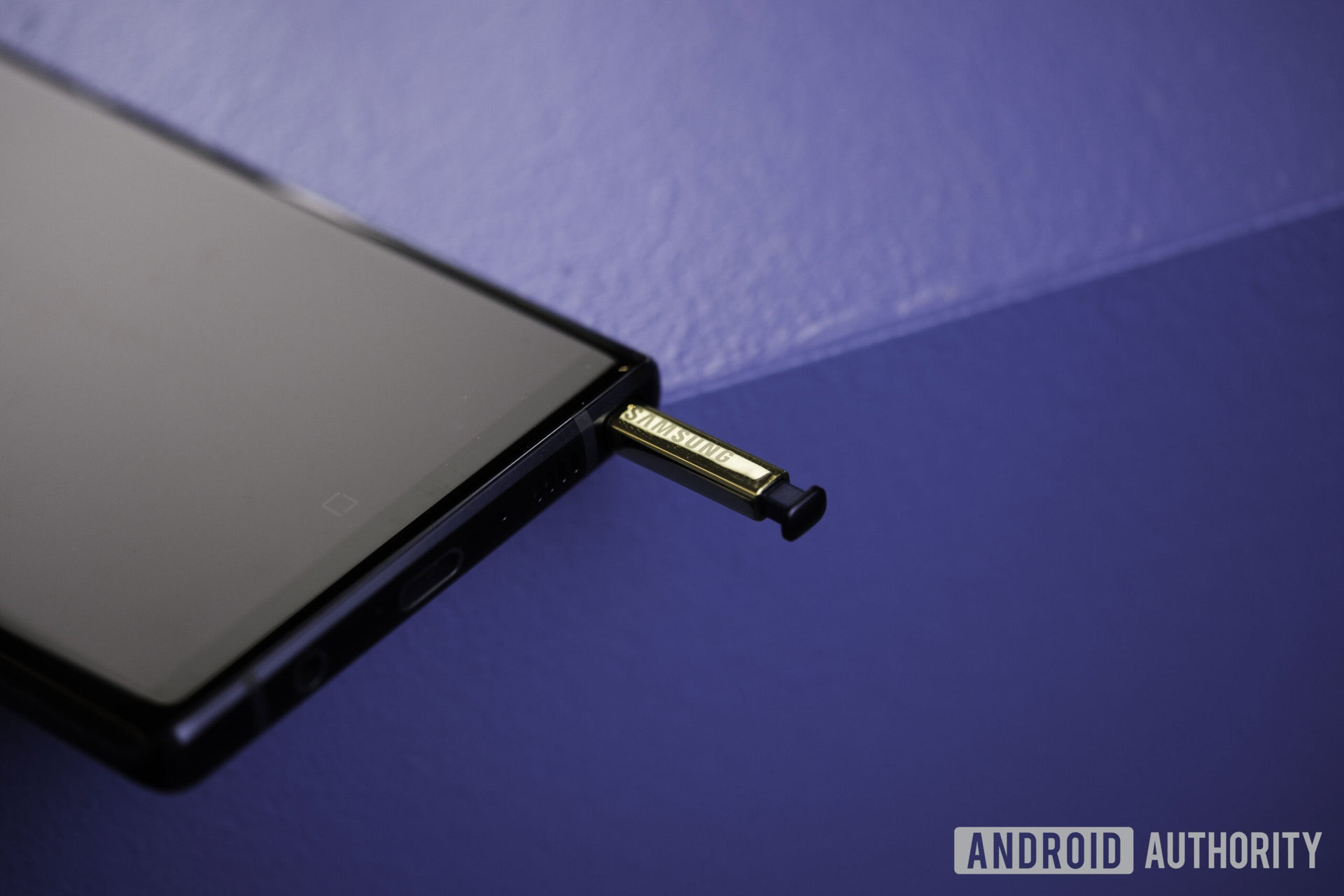Affiliate links on Android Authority may earn us a commission. Learn more.
Samsung Galaxy S10/Plus vs Galaxy Note 9: Battle of the 6-inchers
March 10, 2019

Along with the smaller Samsung Galaxy S10e, Samsung is now selling two bigger Galaxy S10 flagship phones: The Galaxy S10, with its 6.1-inch display, and the Galaxy S10 Plus, with its even bigger 6.4-inch screen.
Read more – Galaxy S10 and S10 Plus hands-on
These phones launched around seven months after the latest Samsung phone flagship, the Galaxy Note 9. How does the older Note 9 compare to its newest large siblings? Let’s find out how these three phones shape up next to each other:
Samsung Galaxy S10/S10 Plus vs Galaxy Note 9: Specs and features
| Samsung Galaxy S10 | Samsung Galaxy S10 Plus | Samsung Galaxy Note 9 | |
|---|---|---|---|
Display | Samsung Galaxy S10 6.1-inch AMOLED panel 3,040 x 1,440 resolution 551ppi 19:9 aspect ratio | Samsung Galaxy S10 Plus 6.4-inch AMOLED panel 3,040 x 1,440 resolution 525ppi 19:9 aspect ratio | Samsung Galaxy Note 9 6.4-inch Super AMOLED 2,960 x 1,440 resolution (Quad HD+) 516ppi 18.5:9 screen ratio |
Processor | Samsung Galaxy S10 8nm octa-core Exynos 9820 / 7nm octa-core Snapdragon 855 | Samsung Galaxy S10 Plus 8nm octa-core Exynos 9820 / 7nm octa-core Snapdragon 855 | Samsung Galaxy Note 9 10nm, 64-bit, octa-core Samsung Exynos 9810 (2.8 GHz quad + 1.7 GHz quad)/10nm, 64-bit, octa-core Qualcomm Snapdragon 845 |
RAM | Samsung Galaxy S10 8GB | Samsung Galaxy S10 Plus 8/12GB | Samsung Galaxy Note 9 6/8GB |
Storage | Samsung Galaxy S10 128/512GB | Samsung Galaxy S10 Plus 128/512GB /1TB | Samsung Galaxy Note 9 128/512GB |
MicroSD | Samsung Galaxy S10 Yes, up to 512GB | Samsung Galaxy S10 Plus Yes, up to 512GB | Samsung Galaxy Note 9 Yes, up to 512GB |
Cameras | Samsung Galaxy S10 Rear: 16MP f/2.2 ultrawide + 12MP f/1.5 and f/2.4 dual pixel with OIS + 12MP OIS telephoto f/2.4 Front: 10MP f/1.9 dual pixel | Samsung Galaxy S10 Plus Rear: 16MP f/2.2 ultrawide + 12MP f/1.5 and f/2.4 dual pixel with OIS + 12MP OIS telephoto f/2.4 Front: 10MP f/1.9 dual pixel + 8MP depth sensor f/2.2 | Samsung Galaxy Note 9 Rear: Dual camera with dual OIS Wide-angle: Super Speed Dual Pixel 12MP AF sensor with OIS, f/1.5 and f/2.4 apertures Telephoto: 12MP AF sensor, f/2.4 aperture, 2x zoom Front: 8MP AF sensor, f/1.7 aperture |
Battery | Samsung Galaxy S10 3,400mAh Non-removable | Samsung Galaxy S10 Plus 4,100mAh Non-removable | Samsung Galaxy Note 9 4,000mAh battery Non-removable |
Wireless charging | Samsung Galaxy S10 Fast Wireless Charging 2.0 Wireless PowerShare | Samsung Galaxy S10 Plus Fast Wireless Charging 2.0 Wireless PowerShare | Samsung Galaxy Note 9 Fast wireless charging compatible with WPC and PMA |
Water resistance | Samsung Galaxy S10 IP68 | Samsung Galaxy S10 Plus IP68 | Samsung Galaxy Note 9 IP68 |
Security | Samsung Galaxy S10 Embedded Ultrasonic fingerprint scanner. 2D face unlock. | Samsung Galaxy S10 Plus Embedded Ultrasonic fingerprint scanner. 2D face unlock. | Samsung Galaxy Note 9 Capacitive fingerprint scanner. Lock type: pattern, PIN, password |
Connectivity | Samsung Galaxy S10 Wi-Fi 6 Bluetooth 5 Cat20 LTE, 7CA, 4x4 MIMO | Samsung Galaxy S10 Plus Wi-Fi 6 Bluetooth 5 Cat20 LTE, 7CA, 4x4 MIMO | Samsung Galaxy Note 9 Wi-Fi 802.11 Bluetooth 5 Enhanced 4X4 MIMO/CA, LAA, LTE Cat. 18 |
SIM | Samsung Galaxy S10 Nano SIM | Samsung Galaxy S10 Plus Nano SIM | Samsung Galaxy Note 9 Nano SIM |
Software | Samsung Galaxy S10 Android 9 Pie | Samsung Galaxy S10 Plus Android 9 Pie | Samsung Galaxy Note 9 Android 8.1 Oreo, with update to Android 9 Pie |
Dimensions and weight | Samsung Galaxy S10 149.9 x 70.4 x 7.8mm 157g | Samsung Galaxy S10 Plus 157.6 x 74.1 x 7.8mm 175g | Samsung Galaxy Note 9 161.9 x 76.4 x 8.8mm 201g |
Colors | Samsung Galaxy S10 blue, green, black, white, pink | Samsung Galaxy S10 Plus blue, green, black, white, pink, black (ceramic), white (ceramic) | Samsung Galaxy Note 9 lavender purple, ocean blue, midnight black, metallic copper |

Samsung didn’t make a ton of changes to the overall looks of the Galaxy S10 and S10 Plus compared to the Note 9. However, there are a few key differences. For starters, the Note 9’s Infinity display had an 18.5:9 aspect ratio, but the S10 and S10 Plus and their updated Infinity-O display have a 19:9 aspect ratio. A larger physical difference is found in the back. The Note 9 only had two rear 12MP cameras, but the S10 and S10 Plus increase that number to three sensors (12MP standard wide angle, 12MP telephoto, and 16MP ultra-wide angle). The Galaxy S10 and S10 Plus can also shoot 4K video, with the option to record in HDR10+.
The Note 9 also had a standard fingerprint scanner on the back below the cameras, but the S10 and S10 Plus replaces it with an in-display fingerprint sensor on the bottom. Speaking of the display, the S10 and S10 Plus use Samsung’s punch-hole design for the front camera, with a single dual-pixel 10MP sensor for the S10, and the S10 Plus throwing in another 8MP depth camera.

While there are minor changes to the looks of the S10 and S10 Plus compared to the Note 9, the far more important changes are found inside. The Galaxy Note 9 has the 10nm Qualcomm Snapdragon 855 chip, while both the Galaxy S10 and S10 Plus are packing the new and faster 8nm Qualcomm Snapdragon 855 chip for the U.S. market, The rest of the world got the 10nm Samsung Exynos 9810 for the Note 9, and the new 8nm Exynos 9820 inside the S10 and S10 Plus. The Note 9 was available in 6GB or 8GB of RAM and either with 128GB or 512GB of onboard storage. The S10 has the same storage options but boosts the memory to 8GB of RAM. The S10 Plus has both 8GB and 12GB of RAM options, and storage options go from 128GB, 512GB and even 1TB.
The Note 9 got a big battery jump compared to the Note 8, with a 4,000mAh size battery. The Galaxy S10’s battery size is indeed lower at 3,400 but inside the Galaxy S10 Plus, the battery edges out the one on the Note 9, with its 4,100mAh size. In addition, the batteries on the S10 and S10 Plus support Wireless PowerShare, which allows them both to act as power sources for other devices with wireless charging support for their batteries.
There are a few things that are the same on all three phones. They all had an IP68 rating for water and dust protection, and both have microSD card slots for adding additional storage. Finally, all three phones keep the old fashioned 3.5mm headphone jack. All of the phones also have Samsung’s Bixby digital assistant on board.

Of course, the Note 9 has an embedded S-Pen stylus like every other Note phone, which is not available on the S10 and S10 Plus. It also includes software created just for the stylus so you can take notes, doodle, or create artwork on the phone with the S-Pen. It even includes Bluetooth hardware that allows the S-Pen to act as a remote control of sorts for the N0te 9, as you can use it launch apps, control the volume of media apps and more.
While the Note 9 shipped with Android 8.1 Oreo out of the box, Samsung and its carriers are slowly updating the phone’s software over the air to Android 9 Pie, and the company’s new One UI skin. The Galaxy S10 and S10 Plus both ship with Pie and One UI out of the box.
Samsung Galaxy S10/S10 Plus vs Galaxy Note 9: Pricing
As we mentioned, the Samsung Galaxy S10 and S10 Plus are available to buy right now. The Galaxy S10 has a starting price of $899, and the S10 Plus will cost at least $999. You can also save some more money if you trade in a qualified older phone.
The Samsung Galaxy Note 9 normally starts at $999, although you can likely find discounts and special deals on other retail sites as well as wireless carriers.
Check out our hands-on reports on the entire Samsung S10 phone lineup:
Thank you for being part of our community. Read our Comment Policy before posting.